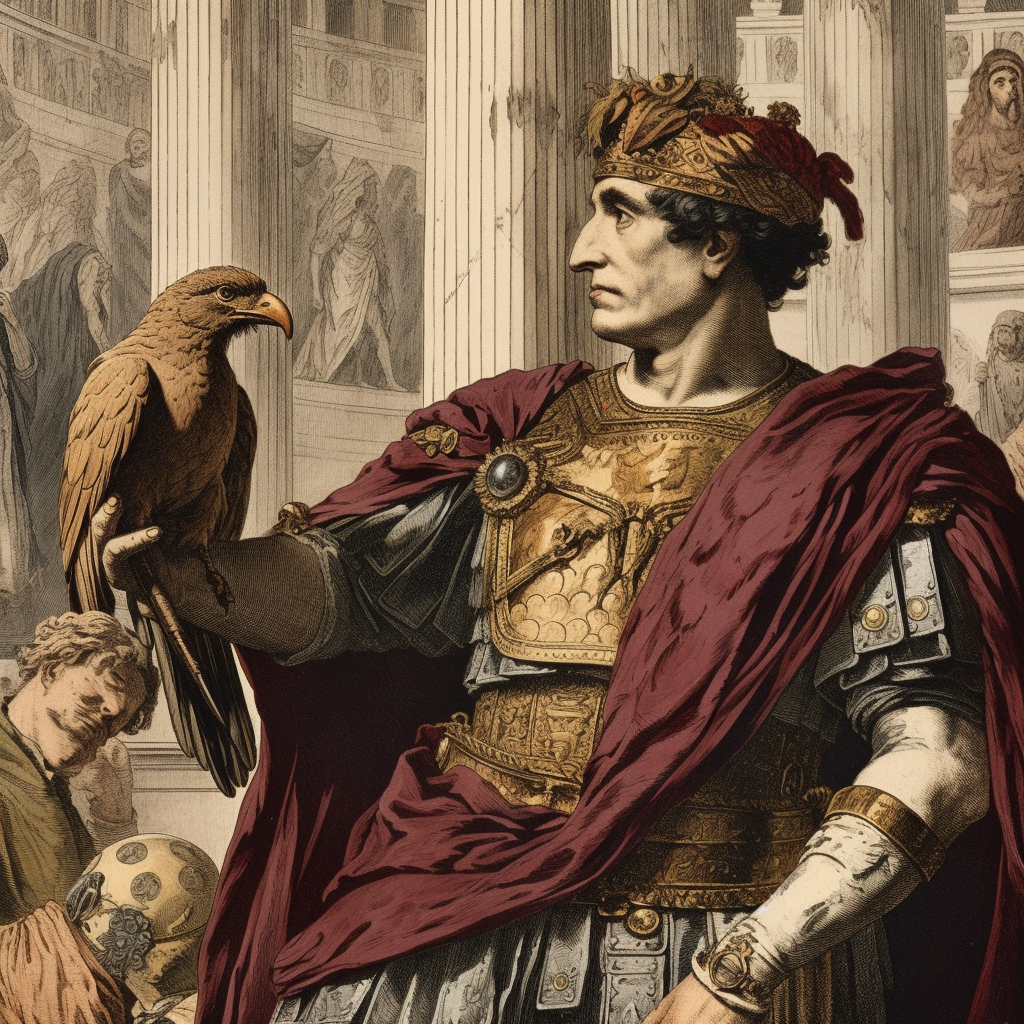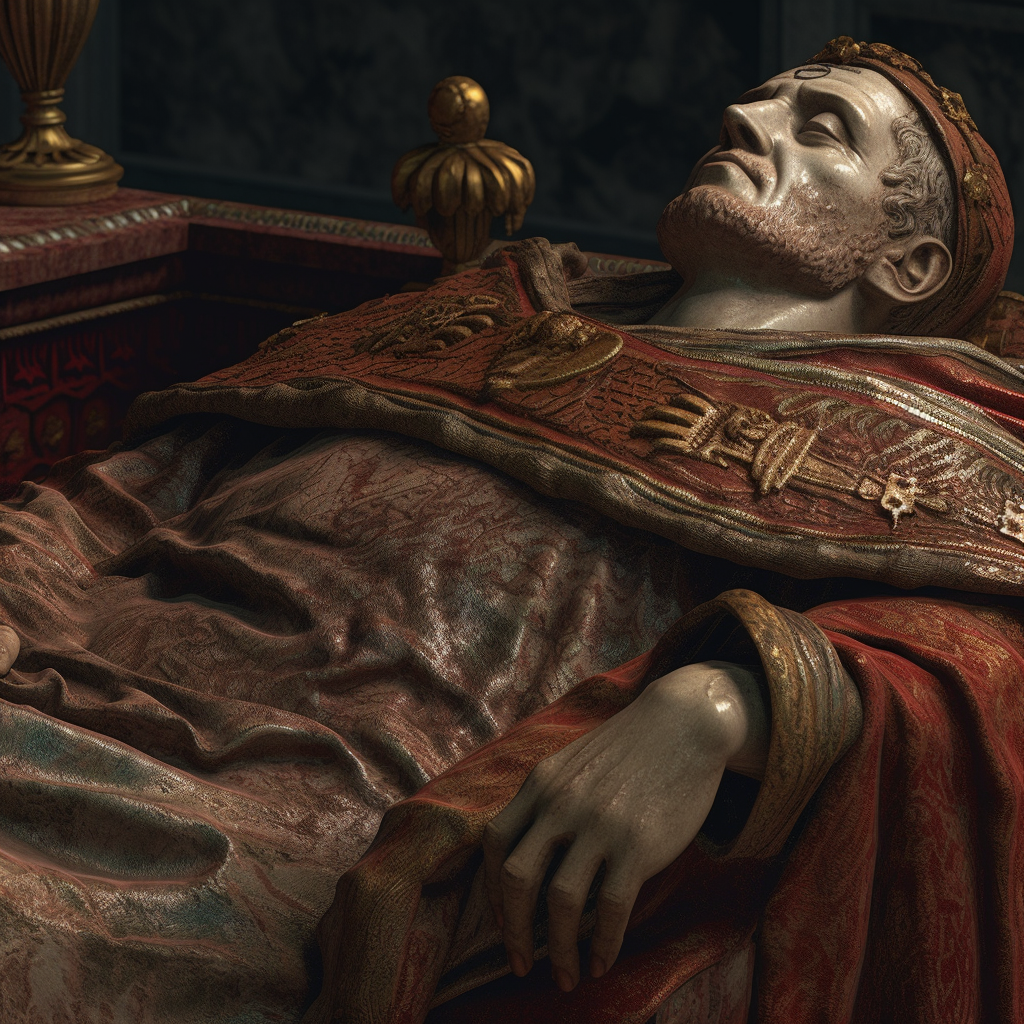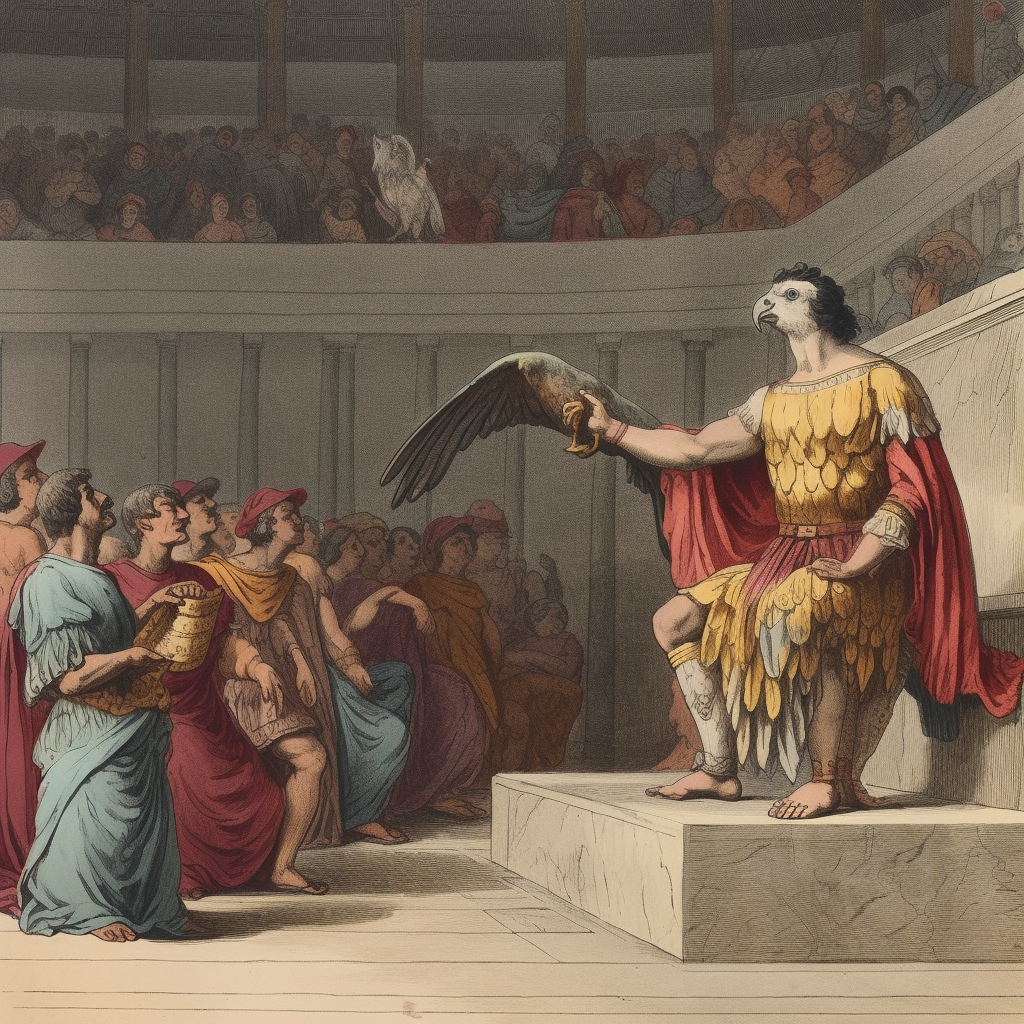The Stochastic Parrot(dox)
The tale of a young emperor of Rome, and his parrot.

Act I
Our story starts as many do, with a Roman emperor ascending to the throne after the death of his uncle.
The senate is quite happy with this tragic turn of events. They would never say it out loud, of course, but they all secretly agreed that the last emperor was kind of an ass. The young emperor-to-be is both well liked by the people, a capable commander in times of war, and a skilled student of philosophy.
However, strangely, our Roman emperor carries a parrot on his shoulder wherever he goes. The people of Rome don't think much of it, as Roman emperors are known for their eccentricities. Some of the more astute senators can't help but notice that this parrot is oddly attentive to all of the decisions the emperor makes. It was almost as if the parrot was studying the preferences of the young emperor, noticing his inclinations towards things and people people and equally as studious of things the young emperor tries to avoid. Quietly, the parrot sits, and on goes the business of Rome.

The exuberant sort, the young emperor has a phrase he likes to use when he leads a charge into battle:
in perceptione, creare!
His troops begin to see this as a rallying cry for the glory of Rome, a sign that that their emperor is with them, to not have fear.
Under his wise judgment and powerful fist, Rome begins to flourish and grow in culture, wealth and architecture. Many people in the streets agree that this young emperor is the best thing that has happened to Rome in recent memory. Even the more cantankerous Romans begrudgingly agree that the state of things are trending in a positive direction.
Act II
Many years have passed, and on goes the business of Rome.
One day, the emperor sits atop his podium (with his parrot on his shoulder, of course), taking forum with his Senate, when a soldier rushes into the assembly.
"My lord, one of our provinces has taken up arms against your name. The local lord has been secretly raising the taxes on the local people, and they have stirred their anger into revolt."
The emperor looks at the soldier, as if lost in thought about what he should do. Should he launch an attack? Or perhaps punish the local errant lord? Which would have the more severe consequences? Which would preserve Pax Romana? All of these thoughts danced in his head, and more.
The young emperor dismisses the forum, saying he must retire to his chamber to weigh his options alone. He walks off solo, only with his parrot by his side.
The young emperor, with his flawless war record, decides that the best course of action is to squash the rebellion. He plans to punish the lord, but this lord happens to be quite popular with the other provinces, so a direct attack might cause unforeseen damage to the health of Rome. The young emperor decides the best course of action is to minimize casualties by cutting the head off the snake of the rebellion, and then exile the lord that has been greedy.
The young emperor marches out of Rome, his soldiers in tow.
On the battlefield, the young emperor rallies his troops with his signature war cry:
in perceptione, creare!
and off they charge into battle.
In the midst of clashing swords, carnal yells of combatants, and the haze of the battlefield, the young emperor is pierced in his chest with an arrow, and falls off his horse. His Praetorian Guard rush to his side and whisk him to his command tent for medical attention, but alas, the wound is grave. The emperor succumbs to his injury in his tent that evening.
The emperor is dead.

Act III
The Senate is in an uproar. The emperor has not chosen an heir and the line is in danger. The Senate fears that the people will revolt, that the lack of a strong leader spells the end of the imperium.
One Senator stands and shouts "We should crown the young emperor's best general! He was with the emperor in all of his conquests!". Another yells from the back, "No, we should crown the emperor's cousin! He is but a child but he shows great potential to lead!". A third yells, "No! This is our chance to restore democracy! There need be no emperor at all!"
Amidst the turmoil, calmly, the parrot that was on the emperor's shoulder bird-walks up to the podium and croaks, quietly, as if this is its own first time hearing its own voice:
in perceptione, creare
The senators pause in their uproar and in disbelief look to the podium. Again, the parrot says, more confidently this time:
clears throat
in perceptione, creare
The senators quietly exchange glances with each other and timidly take their seats.
And on goes the business of Rome.

What Does This Story Mean in 2023?
In 2023, many people, both technical and non-technical, are getting their first foray using large language models on a daily basis thanks to ChatGPT. For many, this new experience is… uncanny. Seemingly all of the choices we make each day, creative or rote, seem to live somewhere, at least partially, in the enormous datasets of GPT or LLama, etc. Whether its developers making more ambitious projects, or a medical diagnosis, it seems that these models are very good at mimicking expert judgement, while simultaneously greatly augmenting the ability of humans using them to make better, more coherent judgements.
Many seek to stump the models, to ask brain teasers or ask for things that there's now way the model should know such as trivia obscura or weird combinatorics of tests questions from distinct fields like an SAT test from hell. And yet, the models return answers that are at minimum plausible, and often quite good, correct, or well above expectation.
Even hallucinations are minimized by models that can use tools, suddenly making hallucination a creative asset instead of a downside. Now when a model goes off the rails, it can be seen as a window into a brand new territory of data to explore, a thread of yarn that once pulled reveals a enormously dense network of ideas.
bramadams.dev is a reader-supported published Zettelkasten. Both free and paid subscriptions are available. If you want to support my work, the best way is by taking out a paid subscription.
In the near future, it's highly likely that there will be many performative local LLMs that will be able to run on smaller and smaller computers. These models won't be as effective at solving societal level problems like the largest models available, but they will be able to watch as you, an individual, make certain judgement calls during the day. Some of these judgement calls are trivial: How do you take your coffee? Do you prefer to read on Kindle or paper? Other decisions will be life level of consequence: Should you accept that job and move? Should you move in with your partner?
We make these judgments and our lives are shaped by their outcomes.
The recommendation algorithms of the '10s picked up on subtle individual preferences people to surface relevant information to them from a massive dataset. The recommendation algorithms of the '20s pick up on subtle individual preferences to help people make judgements.
These judgments are discrete choices that result in action; the potential energy of a thought that has been borne from years of knowledge and personal experience, that manifests as an action that affects the real world -- an essay, a program, a call, a practice session.
The new recommendation algorithms of the '20s are able to create work from these preferences that mimic the originator.
But… that's not entirely true, actually. The new creations are indeed original, in the sense that they were created from nothing -- despite being 99% influenced by the originator. The model itself becomes a ship of Theseus, making decisions that you might make, but making them in a context where you are no longer making them.
In the story above, the young emperor has a parrot companion that astutely studies his judgements, the way that the emperor interfaces with reality. The parrot is external which means it does not have privileged access into the thought process behind the emperor's decisions, it merely sees the output. However, by orbiting closely, the parrot begins to derive how the emperor makes decisions. It is mimetically figuring out how choices work, but not for the purpose of copying them. It is for the purpose of using these choices as a tool to form a mental model of the world that will allow the parrot to derive it's own decisions, much like a teacher and her apprentice. Read the quote below for an example of this -- long, sorry, but worth it:
Human beings acquiring human memes are doing something profoundly different. When an audience is watching a lecture, or a child is learning language, their problem is almost the opposite of that of parroting or aping: the meaning of the behaviour that they are observing is precisely what they are striving to discover and do not know in advance. The actions themselves, and even the logic of how they are connected, are largely secondary and are often entirely forgotten afterwards. For example, as adults we remember few of the actual sentences from which we learned to speak. If a parrot had copied snatches of Popper’s voice at a lecture, it would certainly have copied them with his Austrian accent: parrots are incapable of copying an utterance without its accent. But a human student might well be unable to copy it with the accent. In fact a student might well acquire a complex meme at a lecture without being able to repeat a single sentence spoken by the lecturer, even immediately afterwards. In such a case the student has replicated the meaning – which is the whole content – of the meme without imitating any actions at all. As I said, imitation is not at the heart of human meme replication. (Location 7103)
and
Humans and computers separate continuous streams of sounds or characters into individual elements such as words, and then interpret those elements as being connected by the logic of a larger sentence or program. Similarly, in behaviour parsing (which evolved millions of years before human language parsing), an ape parses a continuous stream of behaviour that it witnesses into individual elements, each of which it already knows – genetically – how to imitate. (Location 7078)
In sum, this story is a fun sci-fi but basically possible with today's technology of what it might look like to have an external companion that studies you, every part of you, for the purpose of continuing you after you stop being… you. If you're a great doctor, your parrot will be a great doctor for generations to come. A great parent? Your parrot will be a great care taker for your great-great-grandchildren. A great dancer? Your parrot (if put inside of some Boston Dynamics type robot) will take your dance moves to stages across the cosmos.
Your best of judgements can proliferate as ideas and computation into the farthest regions of space, borne from you but spread through spacetime like a genome throughout a species.
And on goes the business of Rome.




